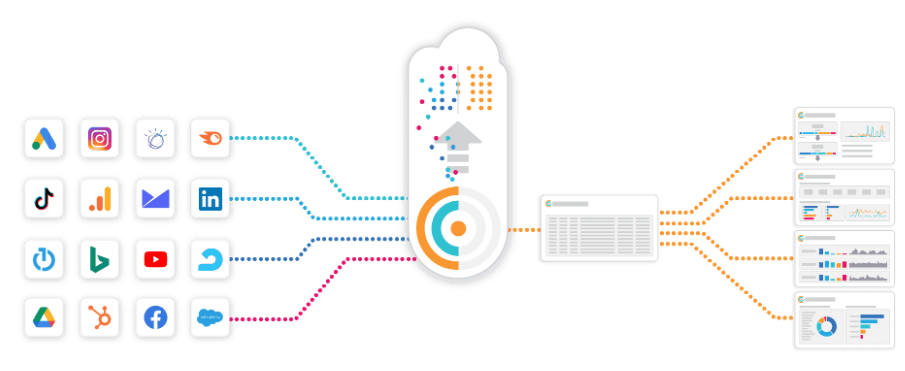In today’s digital age, marketing efforts have evolved and expanded to include various online channels and platforms. With the increased accessibility of technology and online tools, businesses now have an unprecedented opportunity to reach their target audience in more efficient and targeted ways. Sounds like music to any marketer’s ears, right? The challenge though lies in how to coordinate various channels and strategies into one cohesive song. This is where digital orchestration comes into play, a new methodology for managing multiple workstreams so that they complement, never compete.
Digital orchestration refers to the strategic coordination of various digital marketing channels, tools, and platforms to deliver a consistent and impactful message to the target audience. It involves leveraging technology to align marketing efforts and create a seamless customer experience across different touchpoints.
As practiced orchestration conductors, Bluetext explores the concept of digital orchestration in marketing to discuss its benefits, challenges, and best practices.

Benefits of Digital Orchestration
- Consistency: Digital orchestration helps maintain a consistent brand identity and message across different channels. Consolidating efforts to a single team or agency partner can bring endless long-term benefits to your brand identity. Centralization of creative, campaign management and content creation ensures that customers receive a cohesive experience, whether they are interacting with a brand through social media, email campaigns, or website.
- Efficiency: By efficiently managing marketing activities across various channels, businesses can optimize their resources and reduce wasteful spending. Rather than reporting on multiple campaign performances at different intervals, digital orchestration times all reporting to the same frequency within a single dashboard, so that businesses have full visibility into what is and isn’t working. Digital orchestration allows for a seamless flow of data, to ensure all efforts are targeted and effective.
- Personalization: With the help of data analytics and customer profiling, digital orchestration enables marketers to deliver personalized content and offers to their target audience. With a clearer understanding customers’ preferences and behaviors, businesses can tailor their marketing messages to resonate with individual consumers, leading to higher engagement and conversion rates.
- Measurability: Digital marketing offers robust analytics and tracking capabilities. Digital orchestration allows marketers to monitor and measure the effectiveness of each channel and campaign. The gaps in one channel can be filled by another, and pace media spend accordingly. in a method led by numbers, followed by experience, orchestration is a data-driven approach that enables informed decisions, optimized marketing strategies, and improved overall performance.
Challenges in Digital Orchestration
This all sounds promising, so why aren’t all organizations embracing this strategy? While digital orchestration brings significant benefits, it poses some challenges in management and resources, which can be overcome by an agency partner:
- Complexity: With the abundance of marketing channels and platforms available, managing and coordinating them effectively can be a daunting task. Marketers must invest time and effort in understanding various digital tools, staying updated with emerging trends, and developing a holistic strategy.
- Data Integration: One of the fundamental aspects of digital orchestration is integrating data from different sources to gain a comprehensive view of customers’ interactions. However, merging data from various channels and systems can be challenging due to compatibility issues and technical complexities. Hiring an agency with data integration and CRM experience is critical to success.

Best Practices for Digital Orchestration
To succeed in digital orchestration, digital marketers adopt the following methods and best practices:
- Define a Clear Strategy: Start by setting clear goals and objectives. Define your target audience, key messaging, and desired outcomes. Develop a comprehensive strategy that aligns all marketing activities towards achieving these objectives.
- Choose the Right Channels: Identify the most relevant channels for your business and target audience. Don’t try to be everywhere; instead, focus on the platforms that will yield the highest ROI. Understand your customers’ preferences and behavior to ensure your message reaches them effectively.
- Integrate Data and Tools: Establish a centralized system where you can collate and analyze data from different channels. This will help you develop a unified view of your customers and make data-driven decisions. Invest in marketing automation tools that integrate with your data sources and enable seamless communication across channels.
- Monitor and Optimize: Regularly monitor the performance of your marketing campaigns and channels. Leverage analytics and tracking tools to measure key metrics and identify areas for improvement. Use A/B testing to optimize your messaging, design, and targeting strategies.
From a private equity perspective, the evolution of marketing in the digital age presents a compelling investment opportunity. As businesses increasingly rely on online channels to reach their target audiences, the need for strategic coordination and efficiency becomes paramount. Digital orchestration emerges as a solution, offering a structured approach to managing diverse marketing efforts. By centralizing resources and leveraging technology, businesses can enhance brand consistency, optimize resource allocation, and personalize customer interactions. However, challenges such as complexity and data integration require careful navigation, making partnership with agencies proficient in these areas essential. Embracing best practices, including clear goal-setting, channel selection, and data integration, is key to realizing the full potential of digital orchestration. Ultimately, by investing in this methodology, private equity firms can position their portfolio companies for sustained growth and competitive advantage in the dynamic digital landscape.
In conclusion, digital orchestration in marketing is a powerful approach to leverage technology and align marketing efforts across various channels. By implementing a robust strategy and following best practices, businesses can create a seamless customer experience, boost engagement and conversion rates, and achieve their marketing goals in the digital landscape.
Ready to take your marketing to the next level? Contact Bluetext to learn about our digital orchestration services and how this could be tailored to your business’ objectives.